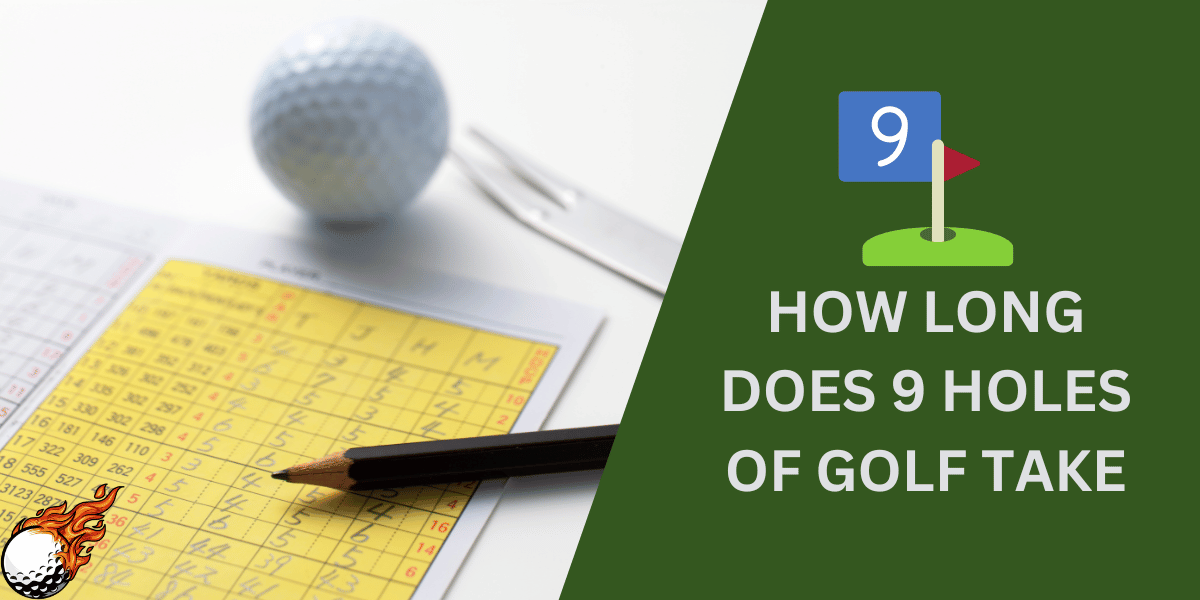
Embarking on a round of golf is not just a test of skill and patience but also an investment of time. For those looking to enjoy the game without dedicating an entire day, playing 9 holes of golf presents a perfect compromise. But how long does 9 holes of golf take? This question, seemingly straightforward, actually unfolds into a tapestry of factors, each adding its own thread to the overall time spent on the golf course.
Playing 9 holes of golf typically takes between 1.5 to 2.5 hours, depending on factors like course difficulty, player skill level, whether you’re walking or using a golf cart, and the pace of play on the course. To ensure a faster game, organize your golf bag, practice ready golf, limit search time for lost balls, and consider booking early tee times or using a golf cart. Improving your game through practice on the putting green or driving range can also help speed up your play.
Understanding the Basics
At its core, a round of 9 holes of golf is exactly what it sounds like: completing half of what is considered a full round of golf. While most golf courses offer the traditional 18 holes, many golf courses provide the option to play just 9, catering to those with limited time or beginners not ready to tackle all 18.

Average Play Time on Golf Course
On average, playing 9 holes can take anywhere from 1.5 to 2.5 hours. This average play time can vary significantly based on a few factors including the skill level of the players, the course difficulty, and the pace of play. An experienced golfer might navigate the course more swiftly than a novice, thanks to fewer lost balls and more accurate tee shots.
Factors Influencing Play Time
Several elements can either add to or reduce the time it takes to play 9 holes:
- Course Difficulty: More challenging courses with longer fairways, numerous hazards, and complex greens can increase the number of shots needed to complete the holes, thereby extending the playing time.
- Slow Play: The pace of other groups on the course can influence your speed. On a busy day, waiting for others can add significant delays.
- Golf Carts vs. Walking: Choosing to ride in golf carts can save time compared to walking, especially on courses with long distances between holes of golf.
- Lost Balls and Searching: Spending time looking for lost balls can add minutes to each hole, affecting the overall duration.
- Ready Golf: A strategy where players are ready to hit when it’s their turn without strict adherence to the farthest from the golf ball goes first, can significantly play faster.
- Tee Time Management: Securing a tee time early in the morning or late in the afternoon when courses are less crowded can lead to a quicker game.
Tips for Faster Play
Maximizing your time on the course involves strategic planning and a few key practices:

- Prepare Your Golf Bag: Organize your golf bag to easily find clubs and accessories, reducing delays between shots.
- Practice Ready Golf: Encourage your group to adopt ready golf principles to keep play moving smoothly.
- Limit Search Time: Agree on a maximum search time for lost balls to avoid lengthy delays.
- Use a golf cart: If walking the course, consider using a golf cart on days you’re pressed for time.
- Familiarize with the Course: Knowing the layout and course difficulty in advance can help you anticipate and plan your shots and next shot, reducing time spent strategizing on the spot.
The Role of Skill Level and Company

Playing with golfers of a similar skill level can make for a more predictable round. However, part of the fun of golf is enjoying the game with friends, regardless of their abilities. Balancing competitiveness with enjoyment is key to a satisfying game that doesn’t drag on unnecessarily.
When the Course Is Yours
An empty golf course is a rare luxury but offers the best opportunity to play at your own pace. Without the need to wait for other players or hurry your shots, you can complete the 9 holes of golf more rapidly or take your time to enjoy each shot.
Conclusion

Ultimately, the time it takes to play 9 holes of golf hinges on several factors, from the difficulty of the course to the efficiency and preparedness of the players. Whether you’re looking to play golf as a quick escape or as part of a leisurely day out, managing these elements can help ensure that your game fits into the time you have available, making every round enjoyable and fulfilling. Remember, the goal is to find that sweet spot where the pleasure of the game meets the constraints of daily life, allowing you to cherish every moment on the green.
We hope this article helped you get a clearer picture of what to expect time-wise when you’re looking to play 9 holes. So, grab your golf bag, book your tee time, and enjoy the game!
Frequently Asked Questions
How long does it typically take to play 9 holes of golf?
On average, completing 9 holes of golf takes about 1.5 to 2.5 hours. This timeframe can vary based on the course’s difficulty, the players’ skill levels, and the day’s overall pace of play.
What factors influence the time it takes to play a round of golf?
Several factors can affect playing time, including the golfers’ experience, the number of players in a group, the difficulty of the course, whether players are walking or riding in carts, and how crowded the course is.
Can I play 9 holes of golf faster by booking early tee times?
Yes, booking early tee times can significantly reduce waiting times on each hole, especially on busier days, allowing for a quicker and more fluid golf game.
Is it quicker to play golf by walking or riding in a cart?
Riding in a golf cart generally allows for a quicker game than walking, as it speeds up travel between the tee box, fairway, and green, especially on courses with long distances between holes.
How can practicing on a putting green or driving range affect my playing time?
Practicing on a putting green or driving range can improve your game, leading to fewer shots per hole and a faster overall pace. This preparation can make you more efficient on the course, reducing the time it takes to play all the holes.









